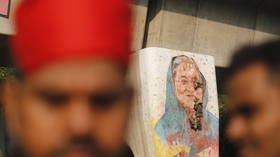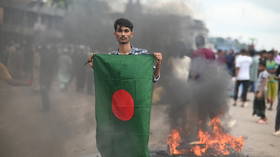Neighbor asks India to extradite ousted PM

The Bangladesh Nationalist Party (BNP), the principal opposition in the South Asian country – which saw a wave of violent protests last month that led to the resignation of Prime Minister Sheikh Hasina – has called on New Delhi to extradite the former leader.
Hasina’s Awami League-led government was toppled earlier this month after weeks of protests against discriminatory job quotas. After resigning, Hasina flew to India where she has been residing ever since. In Bangladesh, an interim government was formed, with 84-year-old Nobel laureate Muhammad Yunus at the helm.
“The people of this country have given the decision for her trial. Let her face that trial,” BNP Secretary-General Mirza Fakhrul Islam Alamgir said on Tuesday, according to the Daily Star. He claimed that while staying in India, Hasina has “started various plots” to “thwart the revolution” that occurred in Bangladesh, while New Delhi, by sheltering the ousted prime minister, contradicts its own commitment to democracy.
A bilateral treaty between New Delhi and Dhaka requires the handing over of individuals against whom proceedings have been initiated in courts for any “extraditable crime.” However, the Times of India noted on Wednesday, citing sources, that the treaty is not applicable to cases that are “political in nature” and requests for extradition that haven’t been made “in good faith” can be rejected.
The BNP party is led by former Prime Minister Khaleda Zia, the key political rival of the ousted prime minister. In 2018, Zia, 79, was sentenced to 17 years in prison over corruption charges during Hasina’s rule. She was released from house arrest after the Awami League’s fall and is undergoing treatment for ailments, according to media reports.
Earlier, the interim government’s foreign affairs adviser, Md. Touhid Hossain, told Reuters that the government will decide whether to ask India to extradite the former prime minister. He added that Hasina’s stay in India “creates an embarrassing situation” for New Delhi.
Over 400 people, including students and police officers, were killed during the weeks-long protests against Hasina’s 15-year rule. On Monday, AFP reported that a war crimes tribunal – which had been set up by Hasina herself – has launched an investigation into mass murder against her. Last week, the UN claimed there were “strong indications” that the Bangladeshi security forces used unnecessary force in its attempts to quell the uprising.
Hasina initially intended to travel to the UK from India to seek asylum, but her plan hit a roadblock. Meanwhile, New Delhi is prepared to host her in the country for “as long as it takes,” the Indian Express has reported, citing unnamed sources.
Hasina’s son Sajeeb Wazed Joy, speaking to the Times of India, said his mother intends to return to Bangladesh when the caretaker government decides to hold the next election.













